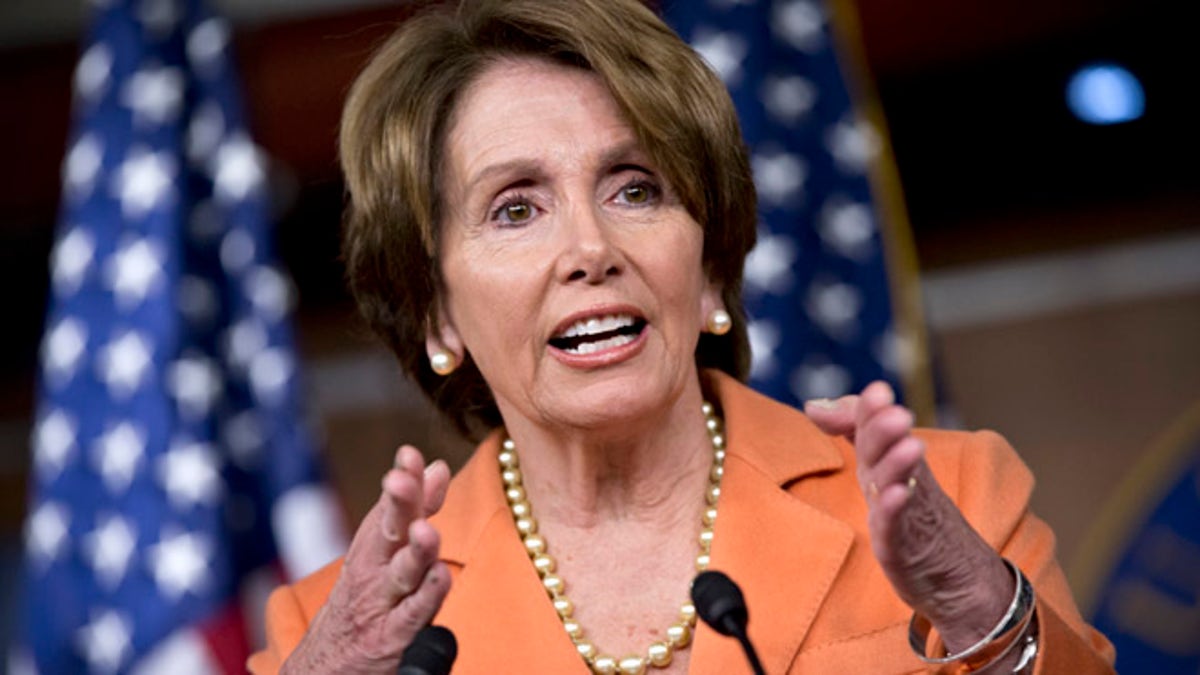
FILE: Dec. 13, 2012: House Minority Leader Nancy Pelosi gestures as she meets with reporters during a news conference on Capitol Hill, in Washington, D.C. (AP)
While Democrats claim Republican resistance to tax hikes has hamstrung House Speaker John Boehner in talks over the looming fiscal crisis, President Obama's allies are drawing some red lines of their own.
The result is that anything Obama and Boehner might agree to faces an uncertain fate on the floors of the House and Senate.
The item that has most galvanized Democrats in opposition is the prospect of raising the Medicare eligibility age. This was included in Boehner's counterproposal last week and has long been discussed as part of a long-term deficit-reduction package.
But while talks between Boehner and Obama sputter, Democratic leaders on Capitol Hill have used the window to mount a stiff resistance. House Democratic Leader Nancy Pelosi this week gave the idea a big thumbs-down, only to be echoed days later by Dick Durbin, the No. 2 Democrat in the Senate.
"Raising the Medicare age represents more of the same," Pelosi wrote in a USA Today column. "For seniors nearing retirement, it means less security for themselves and their families. It betrays the bedrock promise of Medicare: that Americans who work hard and take responsibility all their lives can know dignity in their later years."
The hardening opposition among Democrats to this entitlement cut has only complicated talks between Obama and Boehner. While Obama blames Republican opposition to raising taxes on the top 2 percent, Boehner has taken to blaming Obama for glossing over the need for entitlement cuts.
Neither side feels the other has given enough ground -- meaning there is no agreement, with a slew of spending cuts and tax hikes set to take effect in a little more than two weeks.
"The president and his allies have taken so many things off the table the only thing left is the varnish," Senate Republican Leader Mitch McConnell complained on the Senate floor earlier this week.
The president offered a net $400 billion in cuts in his administration's initial proposal and reportedly boosted that to $600 billion in his most recent offer.
But the White House is fuzzy on whether Obama could agree to raising the Medicare age from 65 to 67. In an interview with ABC News, Obama did not close the door, saying the idea is "something that's been floated," and his party is prepared to do "some tough things on the spending side" if Republicans will move on taxes.
[pullquote]
But then Durbin, Obama's former Illinois colleague in the Senate, said Thursday that is "no longer one of the items being considered by the White House."
Durbin's office clarified that he was not saying the White House had told him that directly -- only that he heard it from third-party sources.
White House Press Secretary Jay Carney would not clear up the confusion.
"I haven't seen those remarks, but I can tell you that I'm not going to negotiate specifics," he said when asked about Durbin's comments.
Reminded that Obama appeared to put the idea on the table in the ABC interview, Carney said, "the president is not going to rule in or rule out things in interviews."
At issue is whether to raise the age at which seniors are eligible for federal government-backed health care. Since Medicare's founding in 1966, the retirement age has stayed at 65.
Democrats' rebuttal to proposals that raise the age to 67 is similar to Republicans' rebuttal to proposals that increase taxes on top earners -- it's not nearly enough, by itself, to close the deficit.
Democrats point to a Congressional Budget Office study in January that found that lifting the age to 67 would save the program $148 billion over the next 10 years. However, because some of those seniors would simply shift onto other entitlement programs, like Medicaid, the total savings would actually be more like $113 billion.
Democrats say it's not worth it, considering an estimated 270,000 people would be left uninsured in 2021 if the retirement age were lifted, according to the CBO. A total of 5.4 million people would be affected by that point, though most would find insurance elsewhere.
Republicans, though, note that people are living longer now than when Medicare was first founded. The same CBO report said people on average live for another 20 years after turning 65 -- as opposed to another 14 years back in 1940.
The increase in life expectancy has fueled the growth in spending on entitlements like Medicare and Social Security.
In a fresh bid to energize support for major entitlement cuts as part of any agreement, Boehner on Thursday rolled out a chart that showed federal spending skyrocketing between now and 2041 -- to 40 percent of the nation's total economy.
The chart showed that revenue from Obama's push to increase taxes on the top 2 percent would only fill in a sliver of that amount.
"If you look at the spending problem, you see (the additional tax revenue) does nothing," Boehner said. "The president wants to pretend that spending isn't the problem. That's why we don't have an agreement."











































